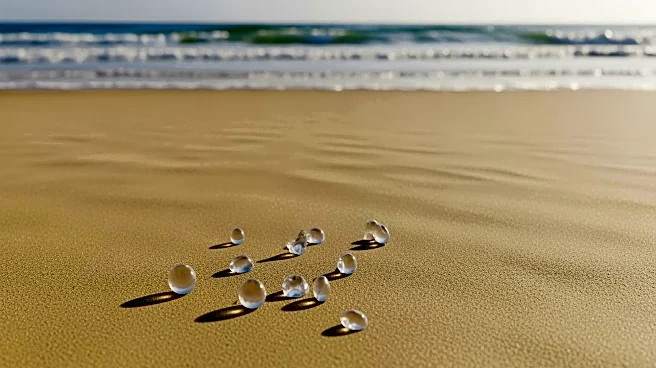What's Happening?
Large quantities of small plastic pellets, known as biobeads, have washed up on the coastline of Camber Beach in East Sussex, causing a pollution incident. Rother District Council has reported the situation and is currently investigating the source of the pollution.
The council has advised dog owners to supervise their pets to prevent them from ingesting the pellets, although there are no immediate public health concerns. The council's officers are inspecting the shorelines to assess the impact and determine the scale of the incident. Non-profit organizations Nurdle and Strandliners are collaborating with council officers to manage the clean-up operation. Andy Dinsdale from Strandliners highlighted the environmental threat posed by the pellets, which are used in wastewater treatment works for cleaning water. The pollution has affected approximately a mile and a half of the beach, and local residents, including Juliet Duff, are participating in the clean-up efforts.
Why It's Important?
The incident underscores the environmental challenges posed by plastic pollution, particularly in coastal areas. The presence of biobeads on Camber Beach threatens the fragile strandline and dune habitats, which are vital for local biodiversity. The situation highlights the need for effective waste management practices and the importance of monitoring and regulating industrial processes that utilize plastic materials. The clean-up operation involves local authorities and non-profit organizations, demonstrating community engagement and the collaborative efforts required to address environmental issues. The incident may prompt further scrutiny of wastewater treatment practices and the use of plastic pellets in industrial applications, potentially leading to policy changes or increased regulatory oversight.
What's Next?
Rother District Council will continue its investigation to identify the source of the plastic pellet pollution. Further updates will be provided as more information becomes available. The clean-up operation will persist, with local residents and organizations working to remove the pellets from the beach. The incident may lead to discussions among environmental groups and policymakers regarding the regulation of plastic use in industrial processes. Potential measures could include stricter controls on the disposal and management of plastic materials to prevent similar incidents in the future.
Beyond the Headlines
The pollution incident at Camber Beach raises broader questions about the sustainability of current industrial practices and the long-term impact of plastic pollution on marine and coastal ecosystems. It highlights the ethical responsibility of industries to minimize environmental harm and the role of local communities in advocating for environmental protection. The situation may also influence cultural attitudes towards plastic use and waste management, encouraging more sustainable practices and increased public awareness of environmental issues.















